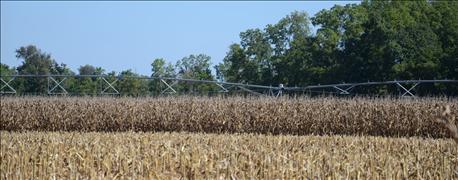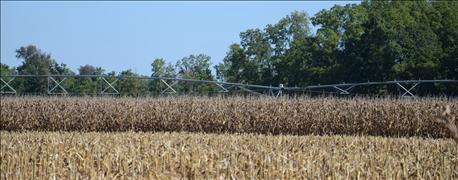
Does no-till help or hurt when it comes to creating and dealing with soil compaction? The answer depends on not only who you talk to, but also what type of situation you are talking about.
Nearly all of Indiana experienced wet conditions in the spring of 2016, which could have led to soil compaction if fields were worked when wetter than desirable. However, harvest conditions were ideal in southern Indiana.

CONTROLLED TRAFFIC HELPS: This field is farmed in a controlled traffic pattern. No-till makes that possible, the farmer says. He also uses cover crops. Both should help minimize soil compaction.
“We experienced a very dry and warm September, October and November, so I have no concerns about compaction from the fall,” says Darrell Shemwell, manager of the Poseyville branch of the Posey County Co-op and an Indiana Certified Crop Adviser. “Most all of our fieldwork was done, with people planting cover crops, chisel-plowing or disking in many areas.”
What about freezing and thawing if you have soil compaction? Is it more likely to help in one tillage system or another?
“Freezing and thawing cycles will help alleviate soil compaction in all cropping systems,” Shemwell says. “If you have areas that are heavily traveled and deeply compacted, you may want to consider some type of deep tillage or cover crops on those areas.”
Jeff Nagel, an agronomist with Ceres Solutions, Lafayette, and also a CCA, agrees that freeze-and-thaw cycles may help, but only with very shallow compaction. They won’t help with deeper compaction, he says. Larger equipment makes farming more efficient, he notes, but it also increases axle loads and can add to deeper soil compaction.
Nagel says controlled traffic can help reduce the potential for soil compaction. He also says fewer trips over the field will result in better soil structure, which can help soil contend with compaction pressures. Typically, it’s easier to institute controlled traffic systems in reduced tillage.
However, Shemwell has observed a trend in no-till that could possibly lead to more soil compaction. “It seems that over the past few years in no-till situations, we have growers planting their no-till acres earlier because they can get on those acres sooner because it will hold them up,” Shemwell observes. “But in effect, [that] may be causing more compaction.”
About the Author(s)
You May Also Like




